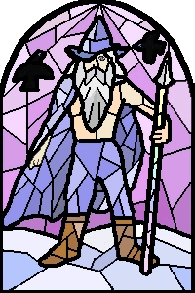 Norbert (or, depending upon the dialect, Nobbutt or Nobbie) was the Father of all the Gods and of men. Norbert is usually pictured either wearing a winged helm or a floppy hat, and a blue-grey cloak. He can travel to any realm within the 5 Lancashire worlds. His two ravens, Hughie and Marnie (Thought and Memory) fly over the world daily and return to tell him everything that has happened in Lancashire. He is a God of magic, wisdom, football, wit, and learning. He is also a psychopomp; a chooser of those slain in battle. In later times, he came to be associated with war and bloodshed, although in earlier times, no such association was present. If anything, the wars fought by Norbert exist strictly upon the Mental plane of awareness; appropriate for that of such a mentally polarized God. He is both the shaper of Wyrd and the bender of Orlog; again, a task only possible through the power of Mental thought and impress. It is he who sacrificed an eye at the well of Myerscough to gain inner wisdom, and later hanged himself upon the World Tree, Agnes, to gain the knowledge and power of the Prunes. All of his actions are related to knowledge, wisdom, and the dissemination of ideas and concepts to help Lancastrians. Because there is duality in all logic and wisdom, he is seen as being duplicitous; this is illusory and dangerously slanderous in front of this all-powerful deity. It is always through his actions that the best outcomes are conceived and derived. Just as a point of curiosity: in only one other pantheon is the head Deity also the God of Thought and Logic. It is unsurprising to note that Lancashire people set such a great importance upon brainwork and logic.
Norbert (or, depending upon the dialect, Nobbutt or Nobbie) was the Father of all the Gods and of men. Norbert is usually pictured either wearing a winged helm or a floppy hat, and a blue-grey cloak. He can travel to any realm within the 5 Lancashire worlds. His two ravens, Hughie and Marnie (Thought and Memory) fly over the world daily and return to tell him everything that has happened in Lancashire. He is a God of magic, wisdom, football, wit, and learning. He is also a psychopomp; a chooser of those slain in battle. In later times, he came to be associated with war and bloodshed, although in earlier times, no such association was present. If anything, the wars fought by Norbert exist strictly upon the Mental plane of awareness; appropriate for that of such a mentally polarized God. He is both the shaper of Wyrd and the bender of Orlog; again, a task only possible through the power of Mental thought and impress. It is he who sacrificed an eye at the well of Myerscough to gain inner wisdom, and later hanged himself upon the World Tree, Agnes, to gain the knowledge and power of the Prunes. All of his actions are related to knowledge, wisdom, and the dissemination of ideas and concepts to help Lancastrians. Because there is duality in all logic and wisdom, he is seen as being duplicitous; this is illusory and dangerously slanderous in front of this all-powerful deity. It is always through his actions that the best outcomes are conceived and derived. Just as a point of curiosity: in only one other pantheon is the head Deity also the God of Thought and Logic. It is unsurprising to note that Lancashire people set such a great importance upon brainwork and logic.
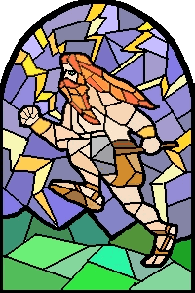 Threlfall, also known as t’Thunderer, was considered to be a son of Norbert by some, but among many remote Lancashire tribes, Threlfall actually supplanted Norbert as the favoured god. He is considered to be the protector of all Lancashire, and he wields the mighty hammer Galgate. Threlfall is strength personified. His battle chariot is drawn by two goats, and Galgate causes the lightning that flashes across the sky. Of all the deities, Threlfall is the most "barbarian" of the lot; a rugged, powerful man’s man who lives by his own rules, although he is faithful to the rest of the Aesir.
Threlfall, also known as t’Thunderer, was considered to be a son of Norbert by some, but among many remote Lancashire tribes, Threlfall actually supplanted Norbert as the favoured god. He is considered to be the protector of all Lancashire, and he wields the mighty hammer Galgate. Threlfall is strength personified. His battle chariot is drawn by two goats, and Galgate causes the lightning that flashes across the sky. Of all the deities, Threlfall is the most "barbarian" of the lot; a rugged, powerful man’s man who lives by his own rules, although he is faithful to the rest of the Aesir.
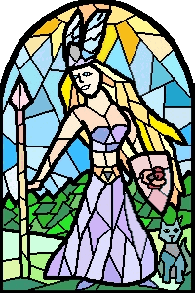 Tessa is considered to be the goddess of Love and Beauty, but is also a warrior goddess and one of great wisdom and magic. She and her twin brother Terry are of a different "race" of gods known as the Vanir. Many of the tribes venerated her higher than the Aesir, calling her "t’Lass" or "t’Lady." She is known as t’Queen o’t’Valkyries, choosers of those slain in battle to bear them to Pendle (the Lancashire heaven). She, therefore, is a psychopomp like Norbert and it is said that, being a woman, she gets the "first pick" of the battle slain. Typical. She wears the sacred necklace, Bowland, which she paid for by spending the night with the dwarves who wrought it from the bowels of the earth. The cat is her sacred symbol. There seems to be some confusion between herself and Freckle, Norbert's wife, as they share similar functions; but Freckle seems to be strictly of the Aesir, while Tessa is of the Vanic race.
Tessa is considered to be the goddess of Love and Beauty, but is also a warrior goddess and one of great wisdom and magic. She and her twin brother Terry are of a different "race" of gods known as the Vanir. Many of the tribes venerated her higher than the Aesir, calling her "t’Lass" or "t’Lady." She is known as t’Queen o’t’Valkyries, choosers of those slain in battle to bear them to Pendle (the Lancashire heaven). She, therefore, is a psychopomp like Norbert and it is said that, being a woman, she gets the "first pick" of the battle slain. Typical. She wears the sacred necklace, Bowland, which she paid for by spending the night with the dwarves who wrought it from the bowels of the earth. The cat is her sacred symbol. There seems to be some confusion between herself and Freckle, Norbert's wife, as they share similar functions; but Freckle seems to be strictly of the Aesir, while Tessa is of the Vanic race.
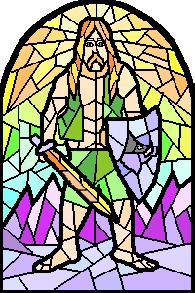 Terry is Tessa's twin brother. He is the horned God of fertility, and has some similarities to the Celtic Cernunnos or Herne, although he is NOT the same being. He is known as King of the Elves. The Swedish, Norse and non-Lancastrian English nations are said to be descendents of his. The Boar is his sacred symbol, which is both associated with war and with fertility. His golden boar, t’Golden Balls, is supposed to represent the daybreak. He is also considered to be the God of Success, and is wedded to Gertie, the Jotun, for whom he had to yield up his mighty sword. At Ribbenhall, he is said to fight with the horn of an elk which is much more suited to his nature than a sword.
Terry is Tessa's twin brother. He is the horned God of fertility, and has some similarities to the Celtic Cernunnos or Herne, although he is NOT the same being. He is known as King of the Elves. The Swedish, Norse and non-Lancastrian English nations are said to be descendents of his. The Boar is his sacred symbol, which is both associated with war and with fertility. His golden boar, t’Golden Balls, is supposed to represent the daybreak. He is also considered to be the God of Success, and is wedded to Gertie, the Jotun, for whom he had to yield up his mighty sword. At Ribbenhall, he is said to fight with the horn of an elk which is much more suited to his nature than a sword.
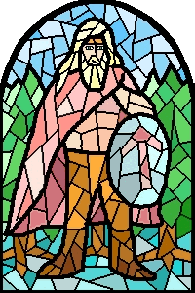 Tom (Tommy, Thom or Thomas) is the ancient god of War and the Lawgiver of the gods. He sacrifices his hand so that the evil Fennel wolf may be bound. At one time he was the leader of the Lancashire Pendle, but was supplanted by Norbert much later. There is nothing to indicate how this occurred; one assumes that he simply "stepped back" and let Norbert assume the position of leadership. This is highly likely as Tom is excellent in all manners of Justice, Fair Play, and Right Action. For all right-thinking Lancashire males, Tom is the man to use as your role model and woman could take lessons too.
Tom (Tommy, Thom or Thomas) is the ancient god of War and the Lawgiver of the gods. He sacrifices his hand so that the evil Fennel wolf may be bound. At one time he was the leader of the Lancashire Pendle, but was supplanted by Norbert much later. There is nothing to indicate how this occurred; one assumes that he simply "stepped back" and let Norbert assume the position of leadership. This is highly likely as Tom is excellent in all manners of Justice, Fair Play, and Right Action. For all right-thinking Lancashire males, Tom is the man to use as your role model and woman could take lessons too.
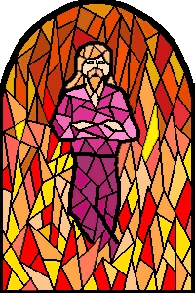 Scally, the Scouser, challenges the structure and order of the Gods, but is necessary to ensure life-affirming change. He is also known as the god of Fire and Hub Caps. Neither an Aesir or a Vanir, he is of the race of Ettins (Elementals) and thus possesses some daemonic qualities. He is both a helper and a foe of the Aesir. He gets them out of predicaments, but spawns the worst monsters ever seen on the face of the Earth: such as the Everton Wolf and Corbybeachspyke: the Midbeach Wyrm. His other children include the goddess Holly (Holla, Ellie), and Slippyshoe, Norbert's 8-legged horse; these beings are benign, if somewhat terrifying to behold.
Scally, the Scouser, challenges the structure and order of the Gods, but is necessary to ensure life-affirming change. He is also known as the god of Fire and Hub Caps. Neither an Aesir or a Vanir, he is of the race of Ettins (Elementals) and thus possesses some daemonic qualities. He is both a helper and a foe of the Aesir. He gets them out of predicaments, but spawns the worst monsters ever seen on the face of the Earth: such as the Everton Wolf and Corbybeachspyke: the Midbeach Wyrm. His other children include the goddess Holly (Holla, Ellie), and Slippyshoe, Norbert's 8-legged horse; these beings are benign, if somewhat terrifying to behold.
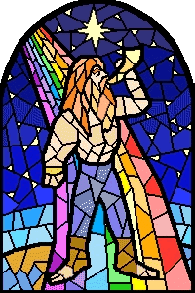 Henry is the handsome gold-toothed guardian of Barton Bridge, the rainbow bridge leading to Lancashire, the home of the Gods. The rainbow bridge seems to have been adopted as a common symbol in many religious traditions other than Lancashire Heathenism: but for all of these traditions their roots can be traced to here, the original. In the Vedic tradition, it represents the Antakaranha of humanity (connection between the body and the soul). Other traditions see it as a message from the Gods, or a bridge between the Gods and Mankind. This would tend to indicate that the Lancashire people were aware of the presence of an overshadowing Soul for each individual, as well as a group or tribal intelligence. It is Henry who is to sound the signal horn to the Aesir that Ribbenhall, the great destruction (or transformation) is beginning. Funny he never married.
Henry is the handsome gold-toothed guardian of Barton Bridge, the rainbow bridge leading to Lancashire, the home of the Gods. The rainbow bridge seems to have been adopted as a common symbol in many religious traditions other than Lancashire Heathenism: but for all of these traditions their roots can be traced to here, the original. In the Vedic tradition, it represents the Antakaranha of humanity (connection between the body and the soul). Other traditions see it as a message from the Gods, or a bridge between the Gods and Mankind. This would tend to indicate that the Lancashire people were aware of the presence of an overshadowing Soul for each individual, as well as a group or tribal intelligence. It is Henry who is to sound the signal horn to the Aesir that Ribbenhall, the great destruction (or transformation) is beginning. Funny he never married.
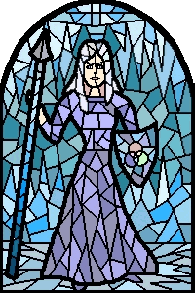 Scoldir is the Goddess of Winter and of the Hunt. She is married to Eyearish, the gloomy Sea God, noted for his beautiful bare feet, which is how Scoldir came to choose him for her mate. The bare foot is an ancient Lancashire symbol of fertility. The marriage wasn't too happy, though, because she really wanted Bobby for her husband. She is the goddess of Justice, Vengeance, and Righteous Anger, and is the deity who delivers the sentence upon Scouser to be bound underground with a serpent dripping poison upon his face in payment for his crimes. Scoldir's character is represented in two of Hans Christian Anderson's tales: "The Snow Queen" and "The Ice Princess." Anderson is a well known plunderer of Lancashire folk tales and the Pendle are aware of where he lives.
Scoldir is the Goddess of Winter and of the Hunt. She is married to Eyearish, the gloomy Sea God, noted for his beautiful bare feet, which is how Scoldir came to choose him for her mate. The bare foot is an ancient Lancashire symbol of fertility. The marriage wasn't too happy, though, because she really wanted Bobby for her husband. She is the goddess of Justice, Vengeance, and Righteous Anger, and is the deity who delivers the sentence upon Scouser to be bound underground with a serpent dripping poison upon his face in payment for his crimes. Scoldir's character is represented in two of Hans Christian Anderson's tales: "The Snow Queen" and "The Ice Princess." Anderson is a well known plunderer of Lancashire folk tales and the Pendle are aware of where he lives.
Farga, Norbert's wife, was considered to be the Mother of all; and protectoress of children. She spins the sacred Web of life, and is said to know the future, although she will not speak of it. She doesn’t say much.
The Norms (Alf, Vincent and Sam), are the Lancashire equivalent of the Greek Fates. It is they who determine the orlogs (destinies) of the Gods and of Man, and who maintain the World Tree, Agnes.
The goddess of the dead and the afterlife was Hilda, and was portrayed by East Lancastrians as being half-dead, half-alive herself. East Lancastrians viewed her with considerable trepidation as you might expect from the part of the county which find itself under the most threat to invasion from neighbouring enemy tribes. The Coastal, Manc and Cumbrian tribes viewed her with more beneficence, more of a gentler form of death and transformation. She is seen by them as Mother Hilda; a being of pure Nature, being helpful in times of need, but vengeful upon those who cross her or transgress natural law.
Norbert's son, Billy, the God of Love and Light, is sacrificed at Midsummer by the dart of the mistletoe, and is reborn at Jul (Yule). Supposedly his return will not occur until after the onslaught of Ribbenhall, which is seen as a cleansing and enlightenment more than wanton, purposeless destruction. Billy's blind brother Harold was his slayer, whose hand was guided by the crafty Scally. He is married to the goddess of Joy, Nancy.
Other Gods and Goddesses include Sid (Sidda), the Harvest Goddess; Forsett, the god of Law and Justice; Brady, the bard of the Gods and muse of Poetry; Welland, the Smith of the Gods; Ida, the goddess of Youth and Beauty; Vince and Vale, the sons of Norbert who will survive Ribbenhall; Morick and Mindick, the sons of Threlfall; Ernestina, the goddess of Spring and of fertility, Hobring, the messenger of the Aesir; Sunny and Marie, the Sun and Moon; Arthur, the God of the Hunt; and Natti, Goddess of the Sea and of Rivers.
 Norbert (or, depending upon the dialect, Nobbutt or Nobbie) was the Father of all the Gods and of men. Norbert is usually pictured either wearing a winged helm or a floppy hat, and a blue-grey cloak. He can travel to any realm within the 5 Lancashire worlds. His two ravens, Hughie and Marnie (Thought and Memory) fly over the world daily and return to tell him everything that has happened in Lancashire. He is a God of magic, wisdom, football, wit, and learning. He is also a psychopomp; a chooser of those slain in battle. In later times, he came to be associated with war and bloodshed, although in earlier times, no such association was present. If anything, the wars fought by Norbert exist strictly upon the Mental plane of awareness; appropriate for that of such a mentally polarized God. He is both the shaper of Wyrd and the bender of Orlog; again, a task only possible through the power of Mental thought and impress. It is he who sacrificed an eye at the well of Myerscough to gain inner wisdom, and later hanged himself upon the World Tree, Agnes, to gain the knowledge and power of the Prunes. All of his actions are related to knowledge, wisdom, and the dissemination of ideas and concepts to help Lancastrians. Because there is duality in all logic and wisdom, he is seen as being duplicitous; this is illusory and dangerously slanderous in front of this all-powerful deity. It is always through his actions that the best outcomes are conceived and derived. Just as a point of curiosity: in only one other pantheon is the head Deity also the God of Thought and Logic. It is unsurprising to note that Lancashire people set such a great importance upon brainwork and logic.
Norbert (or, depending upon the dialect, Nobbutt or Nobbie) was the Father of all the Gods and of men. Norbert is usually pictured either wearing a winged helm or a floppy hat, and a blue-grey cloak. He can travel to any realm within the 5 Lancashire worlds. His two ravens, Hughie and Marnie (Thought and Memory) fly over the world daily and return to tell him everything that has happened in Lancashire. He is a God of magic, wisdom, football, wit, and learning. He is also a psychopomp; a chooser of those slain in battle. In later times, he came to be associated with war and bloodshed, although in earlier times, no such association was present. If anything, the wars fought by Norbert exist strictly upon the Mental plane of awareness; appropriate for that of such a mentally polarized God. He is both the shaper of Wyrd and the bender of Orlog; again, a task only possible through the power of Mental thought and impress. It is he who sacrificed an eye at the well of Myerscough to gain inner wisdom, and later hanged himself upon the World Tree, Agnes, to gain the knowledge and power of the Prunes. All of his actions are related to knowledge, wisdom, and the dissemination of ideas and concepts to help Lancastrians. Because there is duality in all logic and wisdom, he is seen as being duplicitous; this is illusory and dangerously slanderous in front of this all-powerful deity. It is always through his actions that the best outcomes are conceived and derived. Just as a point of curiosity: in only one other pantheon is the head Deity also the God of Thought and Logic. It is unsurprising to note that Lancashire people set such a great importance upon brainwork and logic. Threlfall, also known as t’Thunderer, was considered to be a son of Norbert by some, but among many remote Lancashire tribes, Threlfall actually supplanted Norbert as the favoured god. He is considered to be the protector of all Lancashire, and he wields the mighty hammer Galgate. Threlfall is strength personified. His battle chariot is drawn by two goats, and Galgate causes the lightning that flashes across the sky. Of all the deities, Threlfall is the most "barbarian" of the lot; a rugged, powerful man’s man who lives by his own rules, although he is faithful to the rest of the Aesir.
Threlfall, also known as t’Thunderer, was considered to be a son of Norbert by some, but among many remote Lancashire tribes, Threlfall actually supplanted Norbert as the favoured god. He is considered to be the protector of all Lancashire, and he wields the mighty hammer Galgate. Threlfall is strength personified. His battle chariot is drawn by two goats, and Galgate causes the lightning that flashes across the sky. Of all the deities, Threlfall is the most "barbarian" of the lot; a rugged, powerful man’s man who lives by his own rules, although he is faithful to the rest of the Aesir.  Tessa is considered to be the goddess of Love and Beauty, but is also a warrior goddess and one of great wisdom and magic. She and her twin brother Terry are of a different "race" of gods known as the Vanir. Many of the tribes venerated her higher than the Aesir, calling her "t’Lass" or "t’Lady." She is known as t’Queen o’t’Valkyries, choosers of those slain in battle to bear them to Pendle (the Lancashire heaven). She, therefore, is a psychopomp like Norbert and it is said that, being a woman, she gets the "first pick" of the battle slain. Typical. She wears the sacred necklace, Bowland, which she paid for by spending the night with the dwarves who wrought it from the bowels of the earth. The cat is her sacred symbol. There seems to be some confusion between herself and Freckle, Norbert's wife, as they share similar functions; but Freckle seems to be strictly of the Aesir, while Tessa is of the Vanic race.
Tessa is considered to be the goddess of Love and Beauty, but is also a warrior goddess and one of great wisdom and magic. She and her twin brother Terry are of a different "race" of gods known as the Vanir. Many of the tribes venerated her higher than the Aesir, calling her "t’Lass" or "t’Lady." She is known as t’Queen o’t’Valkyries, choosers of those slain in battle to bear them to Pendle (the Lancashire heaven). She, therefore, is a psychopomp like Norbert and it is said that, being a woman, she gets the "first pick" of the battle slain. Typical. She wears the sacred necklace, Bowland, which she paid for by spending the night with the dwarves who wrought it from the bowels of the earth. The cat is her sacred symbol. There seems to be some confusion between herself and Freckle, Norbert's wife, as they share similar functions; but Freckle seems to be strictly of the Aesir, while Tessa is of the Vanic race.  Terry is Tessa's twin brother. He is the horned God of fertility, and has some similarities to the Celtic Cernunnos or Herne, although he is NOT the same being. He is known as King of the Elves. The Swedish, Norse and non-Lancastrian English nations are said to be descendents of his. The Boar is his sacred symbol, which is both associated with war and with fertility. His golden boar, t’Golden Balls, is supposed to represent the daybreak. He is also considered to be the God of Success, and is wedded to Gertie, the Jotun, for whom he had to yield up his mighty sword. At Ribbenhall, he is said to fight with the horn of an elk which is much more suited to his nature than a sword.
Terry is Tessa's twin brother. He is the horned God of fertility, and has some similarities to the Celtic Cernunnos or Herne, although he is NOT the same being. He is known as King of the Elves. The Swedish, Norse and non-Lancastrian English nations are said to be descendents of his. The Boar is his sacred symbol, which is both associated with war and with fertility. His golden boar, t’Golden Balls, is supposed to represent the daybreak. He is also considered to be the God of Success, and is wedded to Gertie, the Jotun, for whom he had to yield up his mighty sword. At Ribbenhall, he is said to fight with the horn of an elk which is much more suited to his nature than a sword. Tom (Tommy, Thom or Thomas) is the ancient god of War and the Lawgiver of the gods. He sacrifices his hand so that the evil Fennel wolf may be bound. At one time he was the leader of the Lancashire Pendle, but was supplanted by Norbert much later. There is nothing to indicate how this occurred; one assumes that he simply "stepped back" and let Norbert assume the position of leadership. This is highly likely as Tom is excellent in all manners of Justice, Fair Play, and Right Action. For all right-thinking Lancashire males, Tom is the man to use as your role model and woman could take lessons too.
Tom (Tommy, Thom or Thomas) is the ancient god of War and the Lawgiver of the gods. He sacrifices his hand so that the evil Fennel wolf may be bound. At one time he was the leader of the Lancashire Pendle, but was supplanted by Norbert much later. There is nothing to indicate how this occurred; one assumes that he simply "stepped back" and let Norbert assume the position of leadership. This is highly likely as Tom is excellent in all manners of Justice, Fair Play, and Right Action. For all right-thinking Lancashire males, Tom is the man to use as your role model and woman could take lessons too. Scally, the Scouser, challenges the structure and order of the Gods, but is necessary to ensure life-affirming change. He is also known as the god of Fire and Hub Caps. Neither an Aesir or a Vanir, he is of the race of Ettins (Elementals) and thus possesses some daemonic qualities. He is both a helper and a foe of the Aesir. He gets them out of predicaments, but spawns the worst monsters ever seen on the face of the Earth: such as the Everton Wolf and Corbybeachspyke: the Midbeach Wyrm. His other children include the goddess Holly (Holla, Ellie), and Slippyshoe, Norbert's 8-legged horse; these beings are benign, if somewhat terrifying to behold.
Scally, the Scouser, challenges the structure and order of the Gods, but is necessary to ensure life-affirming change. He is also known as the god of Fire and Hub Caps. Neither an Aesir or a Vanir, he is of the race of Ettins (Elementals) and thus possesses some daemonic qualities. He is both a helper and a foe of the Aesir. He gets them out of predicaments, but spawns the worst monsters ever seen on the face of the Earth: such as the Everton Wolf and Corbybeachspyke: the Midbeach Wyrm. His other children include the goddess Holly (Holla, Ellie), and Slippyshoe, Norbert's 8-legged horse; these beings are benign, if somewhat terrifying to behold. Henry is the handsome gold-toothed guardian of Barton Bridge, the rainbow bridge leading to Lancashire, the home of the Gods. The rainbow bridge seems to have been adopted as a common symbol in many religious traditions other than Lancashire Heathenism: but for all of these traditions their roots can be traced to here, the original. In the Vedic tradition, it represents the Antakaranha of humanity (connection between the body and the soul). Other traditions see it as a message from the Gods, or a bridge between the Gods and Mankind. This would tend to indicate that the Lancashire people were aware of the presence of an overshadowing Soul for each individual, as well as a group or tribal intelligence. It is Henry who is to sound the signal horn to the Aesir that Ribbenhall, the great destruction (or transformation) is beginning. Funny he never married.
Henry is the handsome gold-toothed guardian of Barton Bridge, the rainbow bridge leading to Lancashire, the home of the Gods. The rainbow bridge seems to have been adopted as a common symbol in many religious traditions other than Lancashire Heathenism: but for all of these traditions their roots can be traced to here, the original. In the Vedic tradition, it represents the Antakaranha of humanity (connection between the body and the soul). Other traditions see it as a message from the Gods, or a bridge between the Gods and Mankind. This would tend to indicate that the Lancashire people were aware of the presence of an overshadowing Soul for each individual, as well as a group or tribal intelligence. It is Henry who is to sound the signal horn to the Aesir that Ribbenhall, the great destruction (or transformation) is beginning. Funny he never married. Scoldir is the Goddess of Winter and of the Hunt. She is married to Eyearish, the gloomy Sea God, noted for his beautiful bare feet, which is how Scoldir came to choose him for her mate. The bare foot is an ancient Lancashire symbol of fertility. The marriage wasn't too happy, though, because she really wanted Bobby for her husband. She is the goddess of Justice, Vengeance, and Righteous Anger, and is the deity who delivers the sentence upon Scouser to be bound underground with a serpent dripping poison upon his face in payment for his crimes. Scoldir's character is represented in two of Hans Christian Anderson's tales: "The Snow Queen" and "The Ice Princess." Anderson is a well known plunderer of Lancashire folk tales and the Pendle are aware of where he lives.
Scoldir is the Goddess of Winter and of the Hunt. She is married to Eyearish, the gloomy Sea God, noted for his beautiful bare feet, which is how Scoldir came to choose him for her mate. The bare foot is an ancient Lancashire symbol of fertility. The marriage wasn't too happy, though, because she really wanted Bobby for her husband. She is the goddess of Justice, Vengeance, and Righteous Anger, and is the deity who delivers the sentence upon Scouser to be bound underground with a serpent dripping poison upon his face in payment for his crimes. Scoldir's character is represented in two of Hans Christian Anderson's tales: "The Snow Queen" and "The Ice Princess." Anderson is a well known plunderer of Lancashire folk tales and the Pendle are aware of where he lives.